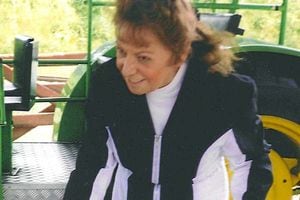Pensioner died after catalogue of errors at Stafford Hospital
It's a catalogue of errors that makes for horrifying reading.

The death of a diabetic pensioner fuelled by systemic failings as a consequence of bosses in charge of an organisation without control.
The full and shocking scale of Gillian Astbury's 'wholly avoidable' death was laid bare for the first time at Stafford Crown Court yesterday.
The 66-year-old from Hednesford was first admitted into Stafford Hospital on April 1, 2007 after breaking her arm and pelvis after suffering falls at Cannock Hospital and at home.
She died in the early hours of April 11 after lapsing into a fatal diabetic coma because two nurses failed to give her the required insulin injections.

Prosecuting Mr Bernard Thorogood said there were failings in the hospital's A&E department, on ward 7 and in the Acute Medical Unit.
He said they were attributable to 'poor governance' of Mid Staffordshire NHS Foundation Trust.
The court heard how cuts to staffing levels while the hospital was in pursuit of coveted Foundation Trust status had, at time, left just one senior nurse in charge of 84 beds.
"How far up does culpability go? It goes right up and is found in the body of the board itself," he said.
Among the most shocking failings include a key 36-page care document critical for recording all patient information within the first 72 hours of admission – but just four pages had been filled in, the court heard.

Her patient number was wrongly written from one form to the next, forms were not signed by senior staff, and the ambulance crews' record which contained important personal information was never attached to Mrs Astbury's medical notes.
And the blood glucose monitoring chart nurses were supposed to fill in four times daily, was only partly completed - and sometimes not filled in at all.
Mr Thorogood also said that on one occasion a trainee nurse wrote down a very high blood sugar reading – 19.8 millimoles, but the senior nurse supervising told investigators she misheard the number and no action was taken. He added a diabetes specialist nurse also said the case was never brought to their attention, despite the senior admitting nurse stating the case 'would have been passed on'.
Mr Thorogood added: "All clinical staff were working in the context of a poorly-led and poorly-ran system with no effective management, oversight or control.
"A tight ship runs well and the converse is demonstrated to be true.
"Nursing staff were set up to fail."
Nurses Ann King was struck off and Jeannette Coulson was cautioned after a Nursing and Midwifery Council panel found them guilty of misconduct in July last year over the failures that led to Ms Astbury's death. The trust pleaded guilty to a charge under the Health and Safety at Work Act brought by the Health and Safety Executive.
Defending the trust, Mr Stephen Climie apologised to Mrs Astbury's family and her partner and carer Ron Street.
"The is a universal sentiment of staff at every level within the trust," he said. "We express our utmost sympathy and condolences to all of those associate with Mrs Astbury."
The trust faces an unlimited fine - but argues that it is a 'unique' case.
Mr Climie said the trust had 'learnt its lessons' with six years of 'being in the public spotlight' but admitted ex-bosses had taken their eye off the ball 'not for a moment but some time'.
The trust is set to be dissolved next week by Health Secretary Jeremy Hunt because it is financially and clinically unsustainable – losing around £20 million a year, it has been revealed.
Hearing the case, The Honourable Mr Justice Haddon-Cave, of the Queen's Bench Division of the High Court, spoke of the 'conundrum' of being asked to fine a public body but that how in doing so could 'impact on its ability to deliver that public service'.
Mr Justice Haddon-Cave adjourned the case and will deliver his sentence at a later date.





